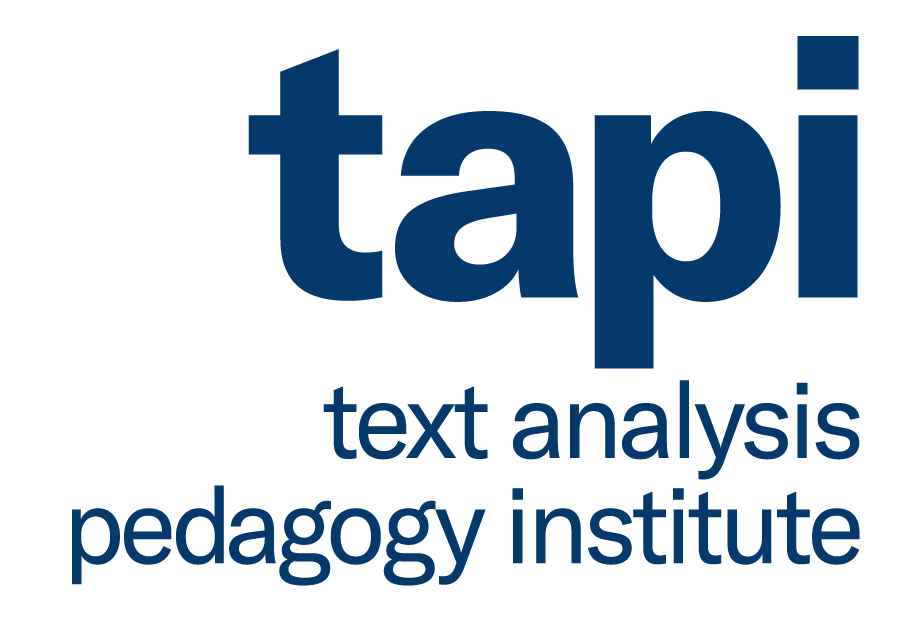Contents
Institute Instructors¶
Rafael Alvarado, Ph.D. (University of Virginia)¶

Raf Alvarado is Associate Professor, Academic General Faculty, in the School of Data Science at the University of Virginia, where he serves as Director of the residential master’s program and teaches courses on textual and cultural analytics. His research lies at the intersection of anthropology, media studies, and data science. He is a member of the Human Machine Intelligence Group of the Humanities Informatics Lab, and the Deliberative Media Initiative of the Democracy Lab at UVA. As a participant in the latter, he is co-instructor of the new Forums Curriculum in the area of Information and Disinformation.
Grant Glass (UNC Chapel Hill)¶

Grant is a Ph.D. candidate in English and Comparative Literature at the University of North Carolina at Chapel Hill, studying British literature and culture in the eighteenth and nineteenth century. He is a Graduate Fellow of the Carolina Digital Humanities Initiative, a Graduate Fellow of the Migrations Lab at Duke University, the Assistant Project Manager of the William Blake Archive, the Project Manager for the Bass Connections Project “Representing Migration Through Digital Humanities”, and the Assistant Director of the Digital Literacy and Communications Lab.
Jacalyn Huband, Ph.D. (University of Virginia)¶

Jackie is a Computational Research Support Specialist at the University of Virginia, where she helps researchers move their computational programs onto a high-performance computing (HPC) platform. She also assists the researchers who encounter challenges with code optimizations, parallelizations, and workflows. She has programmed in R, Python, Matlab, C/C++, and Fortran.
Hannah Jacobs (Duke & UNC Chapel Hill)¶

Hannah L. Jacobs is the Digital Humanities Specialist for the Duke Digital Art History & Visual Culture Research Lab where she teaches and conducts research on digital humanities methods for lab courses and projects. She is also pursuing a Master’s in Information Science at the University of North Carolina at Chapel Hill where she is studying historical data, their uses and potential reuses, and surrounding ethical concerns. She is a Graduate Assistant for the On The Books project at UNC Libraries, an initiative using text technologies to discover Jim Crow laws found in North Carolina’s session laws.
Nathan Kelber, Ph.D. (JSTOR Labs)¶

Nathan is the Community Engagement Lead for JSTOR Labs and the director of the TAP Institute. He teaches text analysis for the benefit of the Constellate community.
Zoe LeBlanc, Ph.D. (Princeton)¶

Zoe LeBlanc is a Postdoctoral Associate and Weld Fellow at the Center for Digital Humanities at Princeton University. More information about her projects and teaching is available on her website.
William Mattingly, Ph.D. (Smithsonian Data Science Lab)¶

William Mattingly is a Postdoctoral Fellow for the Analysis of Historical Texts at the Smithsonian Institution Data Science Lab in collaboration with the United States Holocaust Memorial Museum (USHMM). His research has focused on developing text classification neural network models to identify sources in medieval texts. He is also developing named entity recognition (NER) models for ancient and medieval languages, such as Latin (Classical and Medieval), Ancient Greek, Old English, Old Norse, and Old High German for the Classical Language Toolkit. At the Smithsonian and USHMM, he is developing machine learning methods to aid, in among other things, a pipeline for automatically processing and cataloging hundreds of millions of Holocaust documents. He maintains Python for Digital Humanitites and is the author of the textbook Introduction to Named Entity Recognition for Digital Humanities.
Melanie Walsh, Ph.D. (Cornell)¶

Melanie Walsh is a Postdoctoral Associate and Visiting Lecturer in Information Science at Cornell University. She is the author of Introduction to Cultural Analytics & Python, an interactive programming textbook for the humanities and social sciences.
